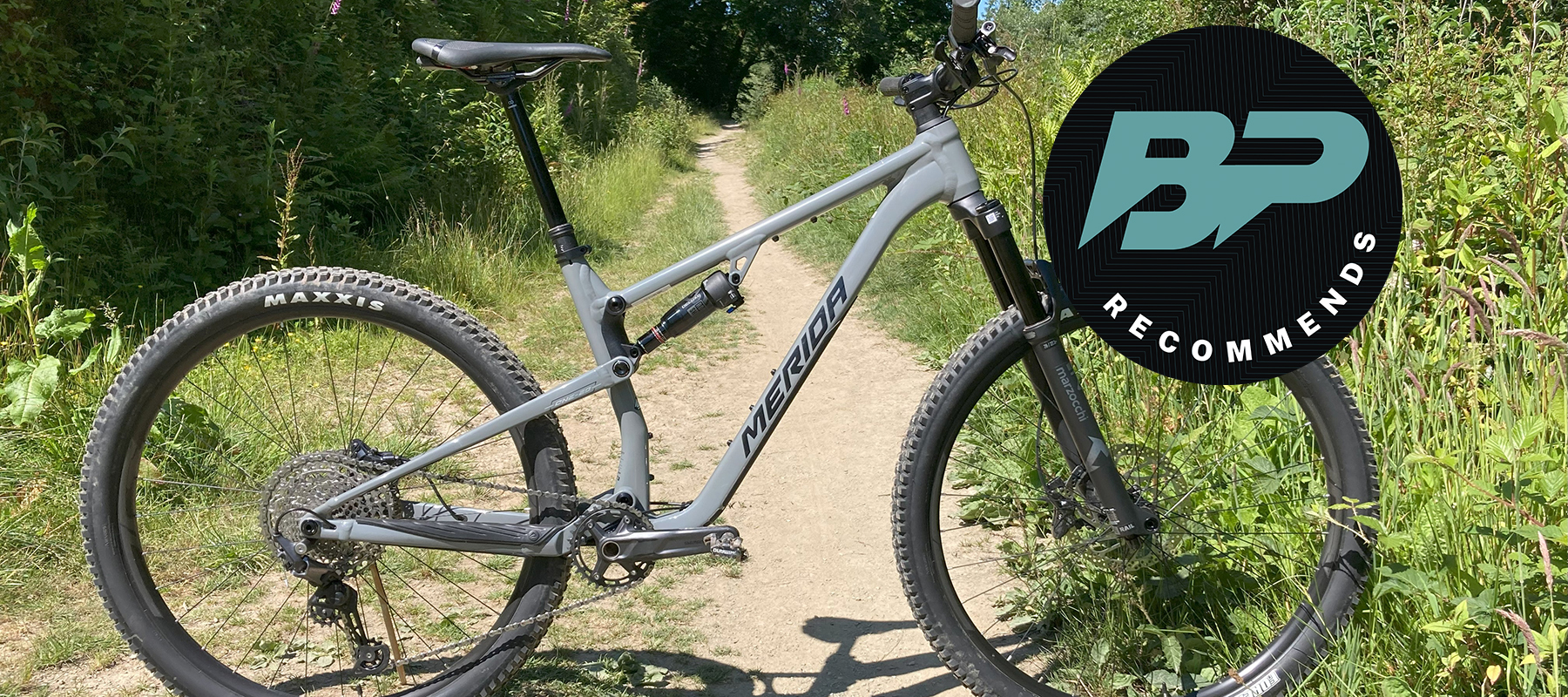Bike Perfect Verdict
The One-Twenty range from Merida offers excellent value for money, with well-considered component packages across the range. The 600 hits that sweet spot of value and performance and, for me, it’s only the choice of front tire that is questionable. I’ve really enjoyed my time on the One-Twenty 600. It’s a great example of what £2,500 can get you, with bags of fun and capability on tap.
Pros
- +
Composed climber and great fun descender
- +
Neutral characteristics for all-rounder biking
- +
Hassle-free component package proved durable throughout testing
- +
Lifetime frame warranty
Cons
- -
Heavy for an all-rounder at 15.92kg
- -
Maxxis Forekaster lacks grip to push downhill limits
- -
Frame protection began to peel at end of test period
Why trust BikePerfect
I reviewed Merida’s One-Twenty 700 last year at the launch event which included the EX Enduro on Exmoor, and I’d been impressed with its all-round capability. Merida has recently sent us the 600 version to review, which is £600 cheaper than the 700, with an asking price of £2,500. Using the same frame and rear shock, compromises have had to be made to achieve the price reduction, however, Merida has still managed to put together an excellent overall package that belies its relatively low asking price. The 600 is still a short travel trail ripper and has proved to be more than capable on my local trails.
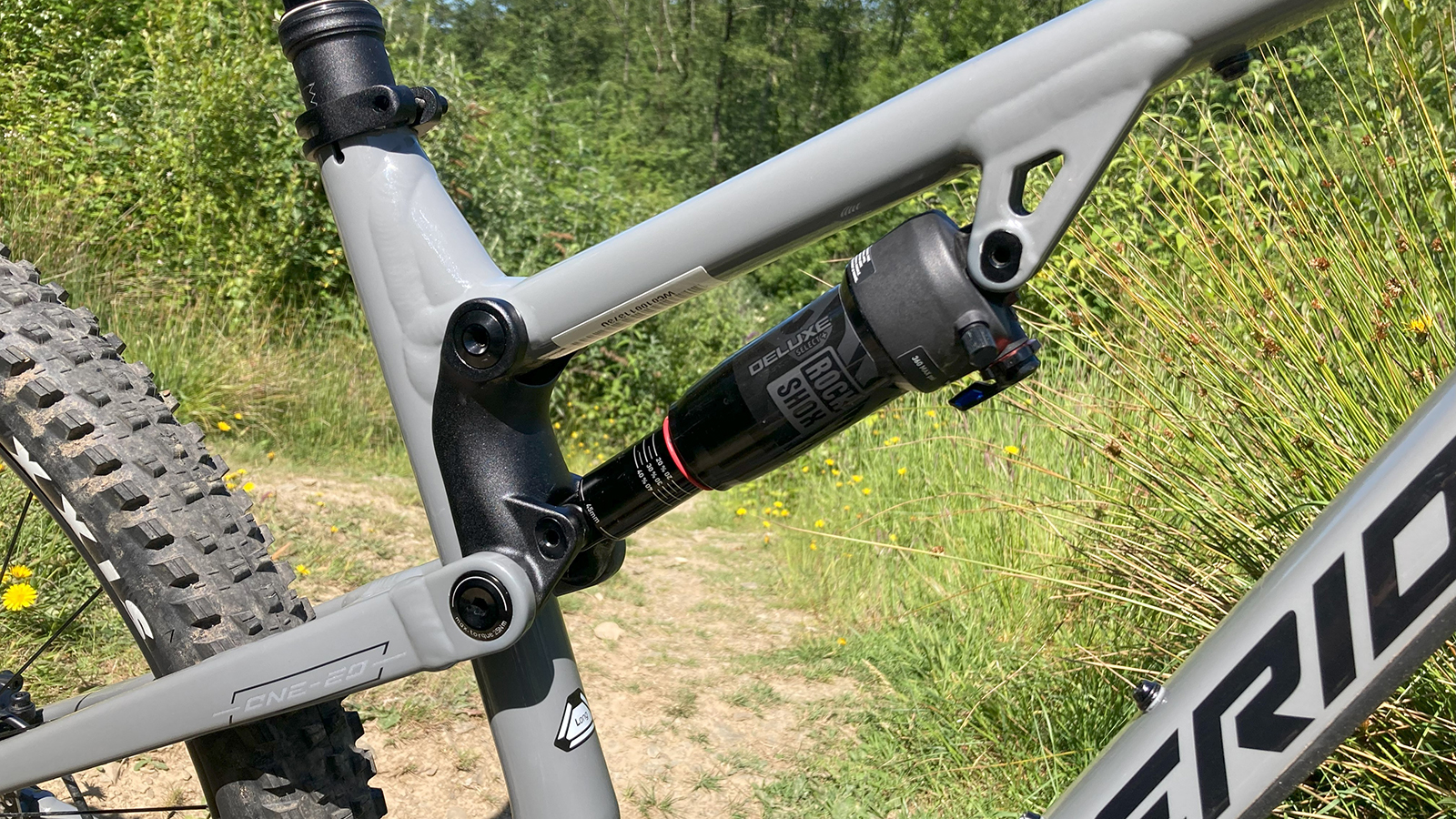
Design and geometry
The bikes in the One-Twenty range all share the same aluminum frame that I detailed in our review of the One-Twenty 700. Essentially the One-Twenty uses a hydroformed aluminum frame, with a pivot-less rear stay design that drives the horizontally-mounted rear shock. Merida calls this its P-Flex suspension platform and it's common across all its trail bikes. The frame can fit two water bottles in the front triangle and on the underside of the top tube in front of the shock mount there are a further two bosses for an accessory mount. There’s a decent-sized rubber chainstay protector and additional frame protection on the underside of the downtube to protect the paint against rock strikes.
Merida has tried to balance the geometry of the One-Twenty to achieve a 60/40 split between descending and climbing duties to support its all-rounder riding intentions. The 66-degree head angle and 78.5-degree seat angle, combined with a generous reach of 485mm on the Long frame and 435mm seat stays, suggest a thoroughly modern geometry, but nothing too outlandish. With low stand-over heights on all sizes, Merida recommends sizing according to your preferred riding style. The brand calls this its ‘Agilometer Sizing System’; choose a longer frame for high-speed stability or a shorter frame for increased agility.
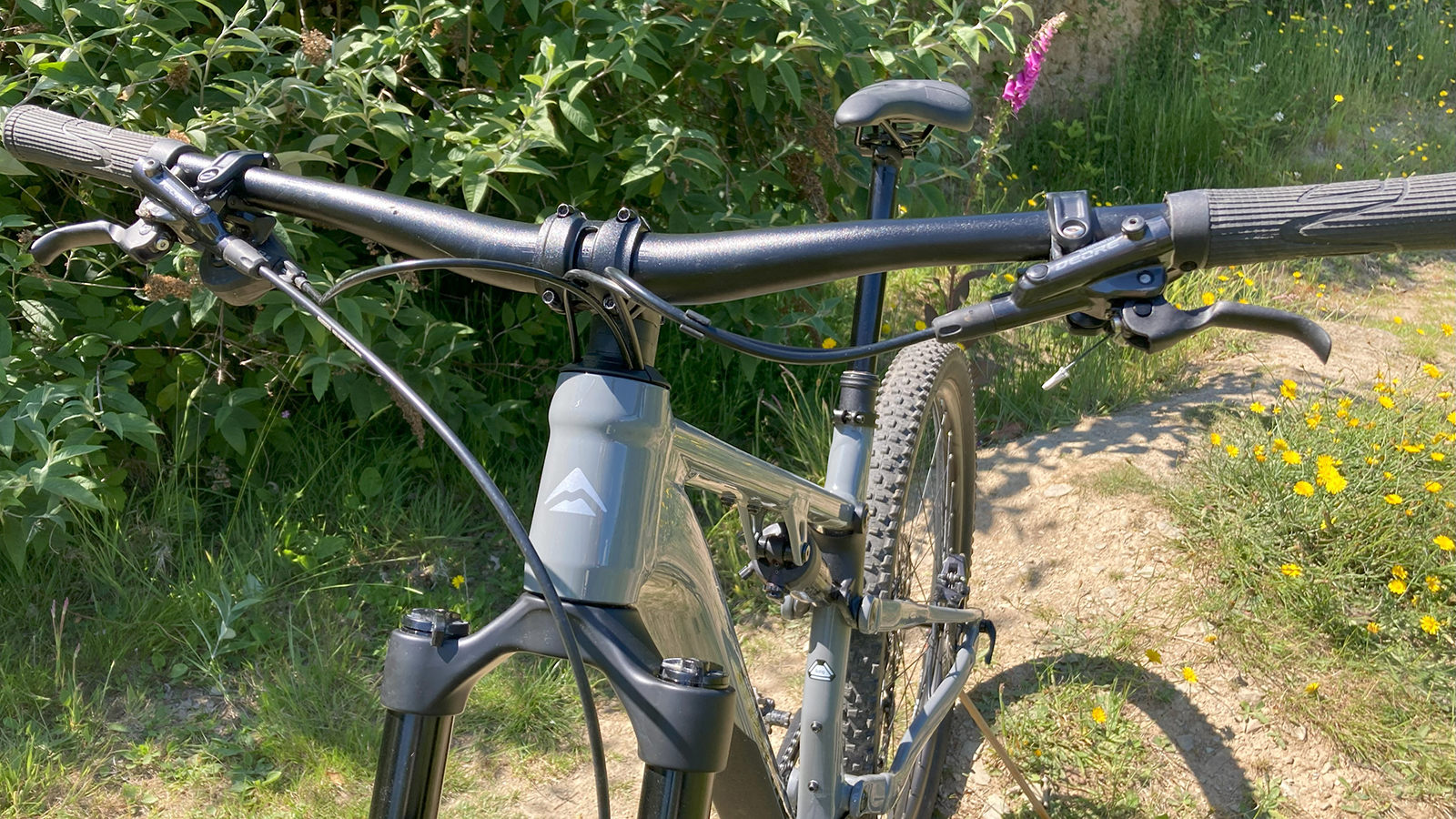
Components and build
The One-Twenty 600 has a well-considered component package, with Shimano taking care of stop and go duties with a Deore 12-speed group set, including the 32-toothed crank and 10-51-tooth M6100 cassette. The front brake uses a Deore 4-pot caliper clamping onto a 203mm center-lock rotor, and the rear a 2-pot Deore caliper with a 180mm rotor.
The rear suspension unit is a RockShox custom-tuned Deluxe Select+ providing 130mm of rear wheel travel and up front you have a 130mm Marzocchi Z2.
The rims are Merida’s own aluminum Comp TR which have a 29mm inner width. These are tubeless ready, but don’t come taped or with tubeless valves. The rims are laced to Shimano TC500 hubs to create a functional, if unspectacular set of hoops. The rear axle lever incorporates a 4 and 6mm Allen key for quick trailside adjustments, which is a neat feature. The tires are Maxxis Forekaster 2.4” TR Exo intended to complement the One-Twenty’s all-rounder intentions.
The finishing kit is all Merida in-house, with a nicely shaped 40mm stem that works well with the internally routed headset, matched to a 35mm diameter, 780mm aluminum handlebar with 18mm rise.
The seating arrangement is also Merida’s own, with a 150mm dropper fitted to the size XS/S, 170mm on the M and 200mm on the L/XL. The saddle is Merida’s Comp SL which at 138mm wide is quite narrow but is well padded and I got on well with it during testing. A nice feature is the integrated multi-tool that attaches to the underside of the saddle and is supplied as standard.
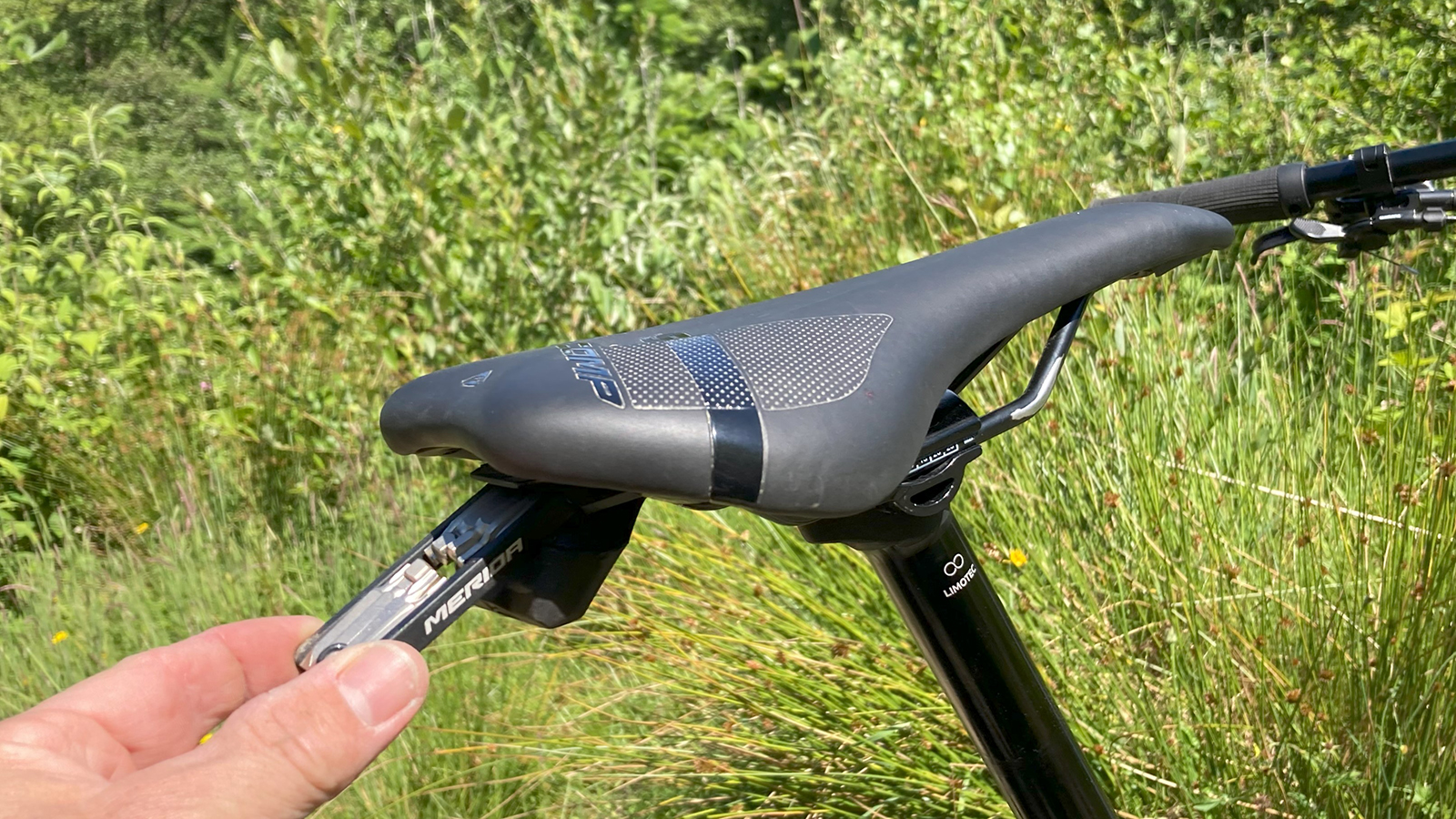
Ride, handling and performance
I’ve already tested the 700 version of the One-Twenty in size Mid and was impressed with the agile and playful riding characteristics, so for the 600 version I’ve been testing the size Long to see if Merida’s Agilometer Sizing System really works. It was evident from the first descent that the long reach and associated wheelbase result in a planted and composed feel which encourages high speeds. Strava times don’t lie, and I was surprised how close I was to my local PBs set on longer travel trail bikes with far more aggressive tires. On the right track and in the right conditions, the One-Twenty 600 really does shine and belies its budget price tag. There’s no hiding from the 15.92kg (without pedals) weight when climbing though and the One-Twenty 600 never felt particularly spritely. However, the 485mm reach combined with the 78.5 degree seat angle, put me in a comfortable seated position for climbing, and with the suspension set up correctly, resulted in a very calm climbing experience. Ditching the inner tubes and setting up tubeless would help shed a chunk of rotating weight and liven things up a bit, and this would be the first change I would make to the stock build.
After the climbing effort, the One-Twenty 600 pays back nicely on the descents. It doesn’t have the magic carpet ride feel of a long travel enduro bike, but the progressive nature of the rear flex stays meant I never felt the ‘thud’ sensation of running out of travel and it allows the One-Twenty to carry speed well, particularly on the Long version. I never felt the need to use the lock-out switch on the rear shock as there is minimal pedal bob when climbing. Merida has pretty much nailed the suspension kinematics on the One-Twenty, with relatively high anti-squat values at the start and middle of the travel to help minimize pedal feedback, which then reduces the further into the travel you go to free up the suspension.
The Marzocchi Z2 is the biggest down spec compared to the 700 version which has the 130mm RockShox Pike up front, and this no doubt contributes to some of the additional weight. The Z2 looks great but does have plastic adjustment knobs and caps rather than machined aluminum ones, which hints at its more wallet-friendly nature. There was absolutely no stiction from the seals from the first ride and, to use a well-worn term, they felt ‘buttery smooth’ from the get-go, and they have remained trouble-free throughout testing. I set the Z2s with the recommended pressure for my weight and the linear spring rate was very noticeable with a lack of ramp-up at the end of the stroke. Hitting big features at speed made the fork dive into its travel far too easily, having the effect of throwing my weight forward and stalling progress. Adding volume tokens would provide more mid-stroke support and bottom-out resistance. Additional tokens would need to be sourced directly from Marzocchi, but thankfully are easy to fit for the home mechanic. I landed up adding an extra 10psi to give a bit more support on the faster descents that the long format excelled at (85psi, two clicks from fully open rebound). Overall, I was very impressed with the Z2s; the 34mm stanchions stand up well when pushed on aggressive trails and they still feel super supple after a few months of testing.
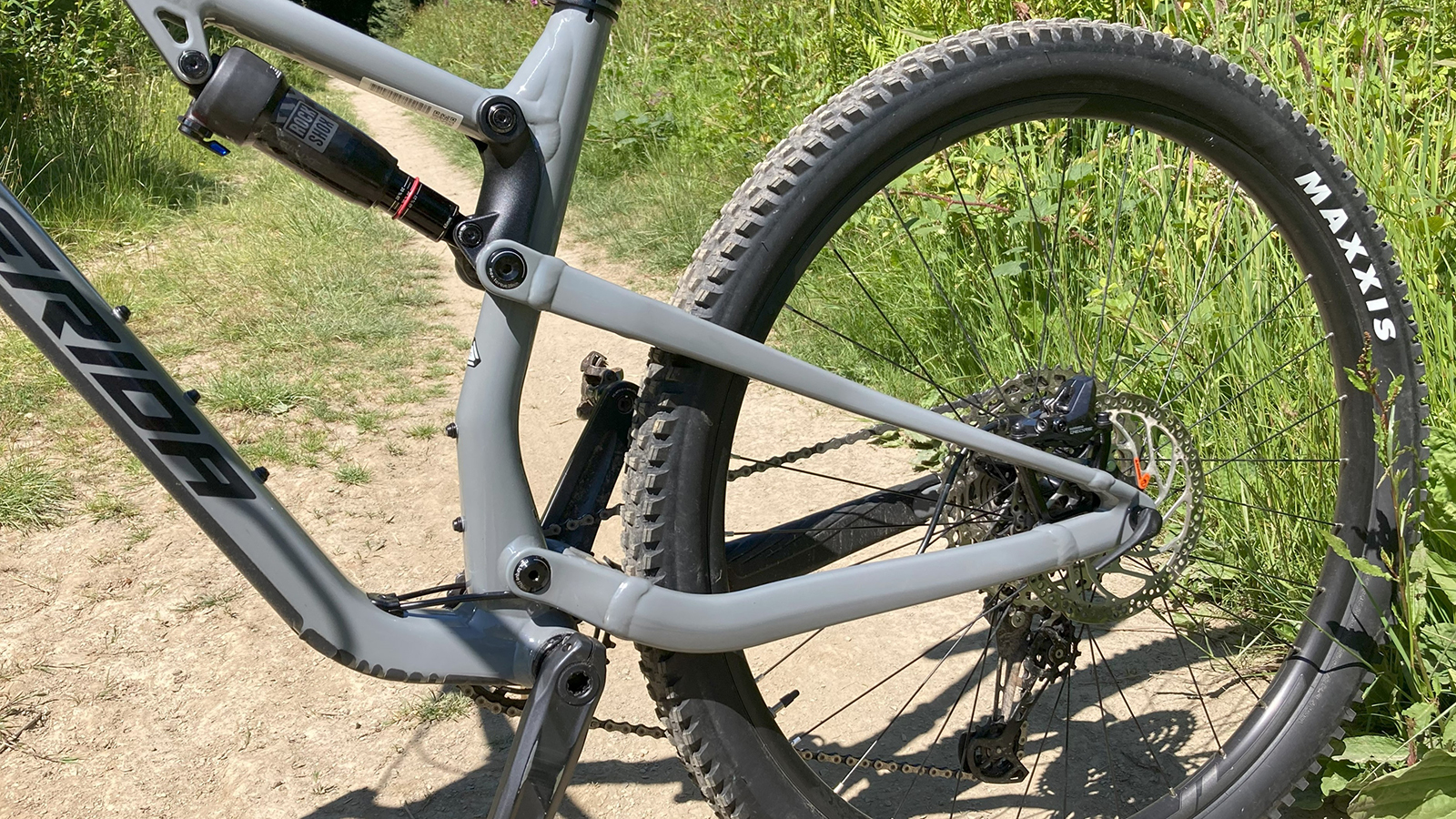
My biggest gripe with the 600 is the tire choice, which is often a hidden compromise on the spec sheet. Merida has specced the Maxxis Forekaster 2.4 Exo, and in many ways, they suit the bike’s do-it-all personality and help keep the weight around the 16kg mark. Unfortunately, they are the cheaper dual-compound rubber variety which I’ve really struggled with. I’ve been testing in conditions ranging from slippery UK mud to bone-dry perfection, and I can’t help but think the front tire is holding the One-Twenty 600 back. Yes, the Forekasters are a great fast-rolling tire and work well when conditions are optimum, but the introduction of any moisture can make front wheel traction downright scary. For less experienced riders the unpredictable grip at the front could be a real challenge. Thankfully it’s not a huge investment to swap out the front tire for something with a bit more bite and grip. Something like the Maxxis Dissector in MaxxTerra compound would really suit the bike’s capabilities and allow you to explore the limits a bit more and make use of the 4-pot front brake and 203mm rotor.
The Shimano Deore drivetrain isn’t the smoothest operator and can sound a bit clunky compared to more expensive groupsets, but that said, it’s worked faultlessly throughout testing and hasn’t needed any attention. The Deore brakes have also been excellent, and I can’t fault them.
When cleaning the One-Twenty 600 for the final time before sending it back, I noticed the stick-on rubber frame protection starting to peel in a couple of locations; nothing a bit of adhesive can’t fix, but a bit annoying all the same.
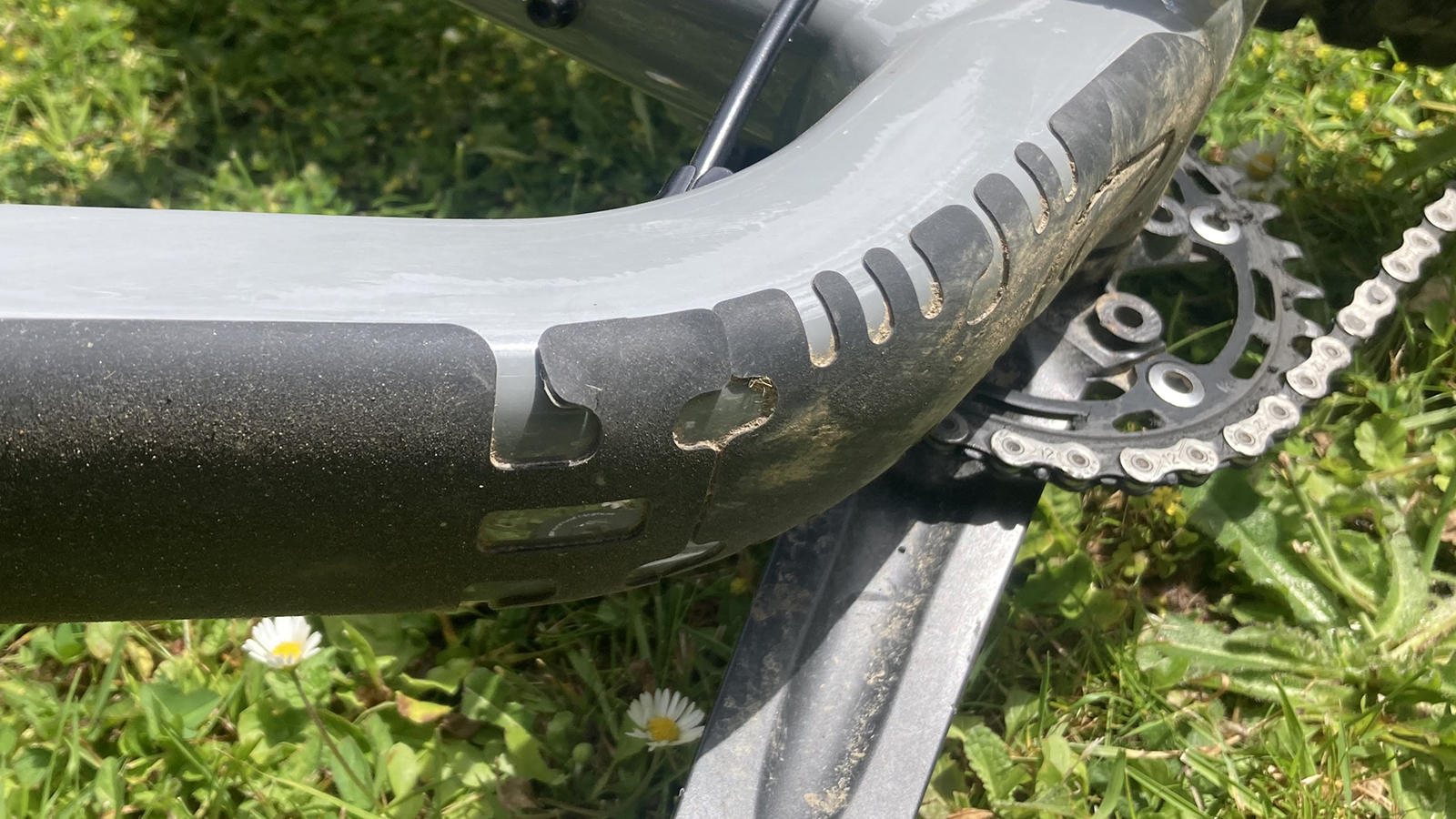
Verdict
The only downside of sizing up to the longer frame with its longer wheelbase is that I’ve missed the smaller frame’s agility, which is noticeable at slow speeds on nadgery and technical descents. It also takes a little more effort to lift the front wheel and boost off trail features. Overall though, the One-Twenty 600 does a great job of balancing climbing and descending duties to suit its all-rounder intentions; you just need to choose your frame size carefully. My biggest take-away from riding the One-Twenty 600 is how sorted the whole package feels. It’s a bit heavy and the front tire needs swapping out to something with a bit more grip, but overall, the One-Twenty 600 is a great example of a well put together bike that just works and puts a smile on your face. In the words of mountain bike legend Keith Bontrager – "Light, strong, cheap… pick two". Merida has clearly picked 'strong and cheap (relatively)' for the One-Twenty 600, and I’ve really enjoyed my time onboard.
| Attributes | Notes | Rating |
|---|---|---|
| Downhill performance | Composed and stable in the Long format. Pick your size to suit where you ride | ★★★★ |
| Climbing performance | Good traction from the rear, but efforts are dulled by the weight | ★★★★ |
| Components and build | Nothing fancy, but everything still works and has performed well. Front tire is only real negative | ★★★★ |
| Value for money | Sorted package for the price, with dealer network support | ★★★★ |
Test conditions
- Conditions: Everything from slick mud to bone-dry perfection
- Terrain: Singletrack to light enduro trails
- Temperature: 8 to 20 C
Tech specs: Merida One-Twenty 600
- Price: $3,166 / £2,500 / €2,500
- Frame: Aluminum, One-Twenty Lite V
- Fork: Marzocchi Z2, 130mm travel, Tapered, 44mm fork offset
- Shock: RockShox Deluxe Select+, lockout
- Headset: Acros ICR
- Derailleur: Shimano Deore M6100, 12-speed
- Shifter: Shimano Deore M6100
- Chain: KMC X12
- Crank: Shimano Deore MT512, 32 teeth, 170mm on all sizes
- Cassette: Shimano Deore M6100, 10-51 teeth, 12-speed
- Bottom Bracket: Shimano BB-MT-501
- Wheels: Merida Comp TR rims (29mm inner width), Tubeless ready. Shimano TC500-B 100x15mm Front Hub and TC500-MS-B 148x12mm Rear Hub
- Tires: Maxxis Forekaster, 29x2.4", fold, EXO, TR Dual
- Brakes: Shimano Deore. Front: 4-pot calliper with 203mm Shimano RT30 rotor. Rear: 2-pot calliper with 180mm rotor
- Handlebar: Merida Expert TR II, aluminum, 780mm width, 18mm rise
- Stem: Merida Expert eTRII, 35mm diameter, 0° angle, 40 mm
- Grips: Merida Comp EC
- Seatpost: Merida Expert TR II, Diameter: 34.9 mm, Setback: 0 mm, Travel: 150 mm XShort, 170 mm Short/Mid, 200 mm Long/XLong
- Saddle: Merida Comp SL, with built-in Merida mini-tool
- Sizes: X Short, Short, Mid, Long, X Long
- Colors: Cool Gray (tested), Silk Metallic Teal
- Weight: 15.92kg without pedals (size Long tested)

James has over 35 years’ riding experience, getting involved with the burgeoning mountain bike scene in the late eighties and hasn’t stopped riding since. He raced cross-country across the South West of the UK for many years and has even dabbled with a bit of road racing. Whether going up, down, steep or flowing, James loves it all. Living in North Devon, the hills aren’t exactly mountainous, but they are plentiful, and James likes nothing better than exploring the wilderness of Exmoor and Dartmoor, and the occasional guided trip to the Alps to get the real mountain experience.
